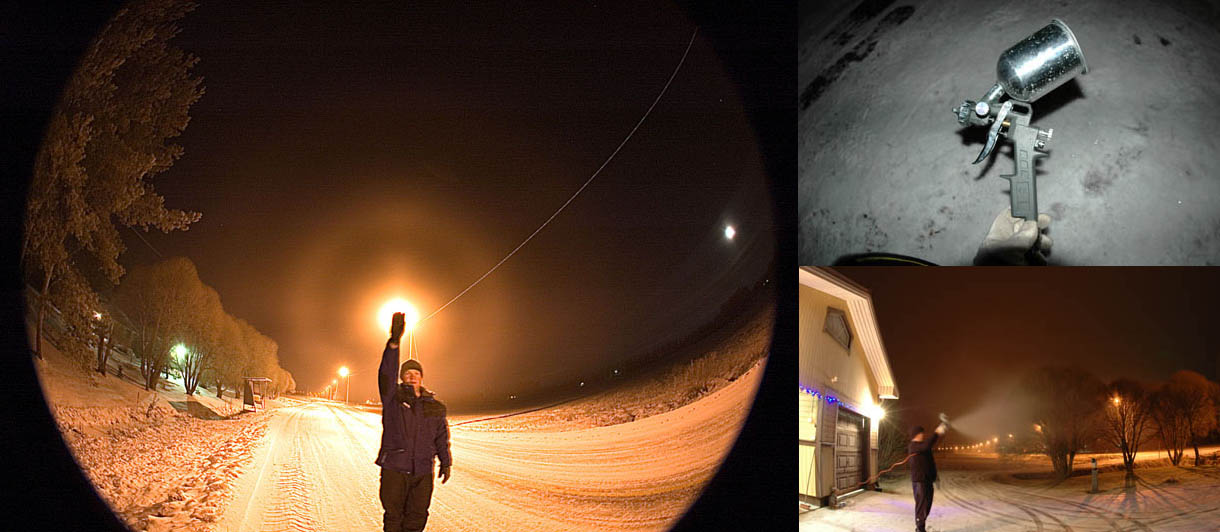Saturday, 15 December 2007
Home Made Halo
During the past year and a half I have tried to figure out how to build a Snowgun. Or, rather, an ice crystal gun since snow is not needed for creating halos. Hence, the objective has been to construct a "halo gun".
After some unsuccesful experimenting I came up with an idea of mixing small amounts of kaoline with water and spraying the solution into air. Kaoline is low cost material mainly used in ceramic industry. The halo gun itself is a simple device: all is needed is an air compressor and a paint spray gun.
On 28 November the weather finally allowed for testing the device. When sprayed into air the solution immediately transformed into ice crystals. I followed the crystal swarm to a nearby road to see whether it created any halos. It certainly did. After the second spraying the halos got even better. I observed both 22 and 46 degree halo, CZA, UTA, M-arc, parhelia, and parhelic circle. The above photograph was captured during the peak of one halo gun generated display.
The halo gun even worked with hot water which prevented the nozzle from freezing. Without Kaoline I was not able to produce ice crystals, regardless of the temperature of the water. Clearly, kaoline plays a huge part in the nucleation process.
Thus far the highest temperature where I have successfully created haloes using this method has been as high as -2 degrees celsius. This ice nucleation temperature is significantly higher than what is cited for Kaolin in various sources in literature. Similar high-temperature ice nucleation characteristic is known for Pseudomonas syringae bacterial protein, which is commonly used to intensify snow production in snow guns.
In January we will go with a small group of people to Kilpisjarvi biological station in the northhernmost Finland to experiment more thoroughly with halo making.
Subscribe to:
Post Comments (Atom)

Marko, this is certainly a breakthrough invention! And you have given us, Hungarians some more hope for seeing diamond dust displays. Now I can't wait to see it live, how it works.
ReplyDeleteExcellent Marko, it's been an exciting journey leading to this point. Well done!
ReplyDeleteMarko, I am really looking forward the Kilpisjärvi trip and a possibility to use your halogun in very low temperatures. You've done spectacular job!
ReplyDeleteWith snow guns the diamond dust sun dogs were already in a loose leash. But now, dut to Mikkilä's invention, the leash has shortened and grip tightened markedly. This opens such a great possibilities.
ReplyDeleteOh wonderful! Brillant job! Could you describe whole construction of this device in detail?
ReplyDeleteWell as i wrote in text, all you need is Air compressor, Paintspraygun,water and kaoline. Air compressor should be big, because paintspraygun use lots of air.
ReplyDeleteAirpressure what i have been used is about 6-8bars
Kaolin makes the small water droplets freeze already at rather high temps. Pure water droplets would not freeze until around -40 C.
ReplyDeleteJust have some device to spray a fine mix of kaolin and water in the air. At simplest it can be a hand pumped garder sprayer. Those allow 3-6 bar pressure depending on the model and they produce a very fine spray of water.
The frozen droplets that come out of the nozzle are not crystals that would readily form halos. Rather, they arc as a nuclei for halo crystal formation when surrounding air is humid enough to exceed ice saturation. There is evidence for splintering taking place during a sudden freezing of a droplet, so it is these splinters that may actually be the nuclei for diamond dust crystals.
You can also try to dust Kaolin dry in the air. Possibly it would not be so effective, the display may form more slowly and may require lower temperatures and higher ice saturations, but still it might be worth trying. The advantage is that you don't need to worry about freezing the sprayer. Some sort of simple device that dusts kaolin in the air continuosly should be developed, perhaps some hour glass -type solution on top of a pole.
I think I will try that except I will use a mist maker which I use in my tornado machine and for the nuclei I will use smoke to help the crystals to form. The reason is because power plants have the tall stacks which release the exhaust from burning the coal while the large cooling tower that vents water vapor mist. Add those two along with single digit or below zero temps who knows gotta try it.
ReplyDeleteSmoke may be effective water nucleator, but possibly it is not as effective ice nucleator as kaolin. But surely it is worth trying, diamond dust halos are commonly formed from factories and power plant plumes.
ReplyDeleteYes you are right on that. One morning on my way to school I saw a bright parhelion in the plume of a power plant. The past few years I have been trying to go to the plants the roads were icy, the sky got overcast, or the temps rose fast. I think I will use my mist maker and add the smoke and at the same time have a pipe to project the vapor and a fan will drive a plume in the subzero air where hopefully a few glitters will form diamond dust and all I need is a halogen light. If seccessful I will try different elevations since we have hills.
ReplyDeleteWe will be waiting for the results, Michael.
ReplyDeleteDon't have your hopes to high because it may not work at all but thats why you gotta give it a whirl or as Larry the cable guy would say, GIT R DONE.
ReplyDelete